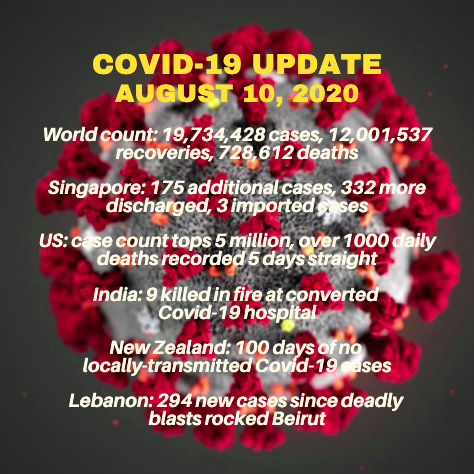As of 8 am, August 10, 2020:
World count: 19,734,428 cases, 12,001,537 recoveries, 728,612 deaths
There are now a total of 19,734,428 confirmed cases of Covid-19 worldwide. The United States has the highest number of coronavirus cases, with 5,126,293 infections, followed by Brazil (3,035,582) and India (2,153,010).
There have been 728,612 deaths from the coronavirus all over the globe since the pandemic began. The US has the highest number of deaths in the world, with 164,763 fatalities from Covid-19, followed by Brazil (101,136), and Mexico (52,006).
12,001,537 people worldwide have recovered from Covid-19.
Singapore: 175 additional cases, 332 more discharged, 3 imported cases
The Ministry of Health (MOH) said on August 9 that there are 175 new Covid-19 cases in the country, of which 1 is a community case and 3 are imported cases. The other 171 cases are of Work Permit holders living in dormitories. Singapore now has a total of 55,104 confirmed cases, with an additional 332 discharged from hospital. A total of 48,915 individuals have recovered.
Of the active coronavirus cases in Singapore, 135 are in hospital, and none are in critical condition in the intensive care unit. 6,027 are in community facilities. Twenty-seven people in Singapore have died of complications due to the Covid-19 infection.
US: case count tops 5 million, over 1000 daily deaths recorded 5 days straight
The US continues to grapple with the pandemic, as its case count surpasses over 5 million since the first infection was reported on January 21. By April 28 the country reached one million cases, 2 million on June 10, 3 million on July 8, 4 million on July 23 and 5 million by August 9.
The country also reported over 1,000 daily deaths for five consecutive days. There have only been 4 days of less than 1,000 Covid-19 deaths since July 21.
India: 9 killed in fire at converted Covid-19 hospital
On August 9, at least 9 people were killed in a fire at Swarna Palace Hotel, which had been converted to a hospital for Covid-19 patients in the city of Vijayawada at Andhra Pradesh in southern India. The fire started at the ground floor of the building, and then spread quickly to the first floor, said Vijayawada city police commissioner B Srinivasulu.
Thirty patients and 12 medical staff were in the building when the fire broke out, he added, which was likely caused by a short circuit at the reception. Andhra Pradesh has a total of 217,040 Covid-19 cases and 1,939 deaths.
New Zealand: 100 days of no locally-transmitted Covid-19 cases
August 9 marked the 100th day of no locally transmitted Covid-19 cases in New Zealand, according to a statement from the Ministry of Health. With only 23 people still undergoing treatment in isolation facilities in the country, the vast majority of the country’s 1,219 cases have already recovered.
However, authorities warned against complacency. “We have seen overseas how quickly the virus can re-emerge and spread in places where it was previously under control, and we need to be prepared to quickly stamp out any future cases in New Zealand. Don’t let the team down – none of us can afford to do that,” said Director-General of Health Dr Ashley Bloomfield.
Lebanon: 294 new cases since deadly blasts rocked Beirut
Lebanon’s Ministry of Public Health reported 294 new Covid-19 cases since the deadly blasts that rocked the city on August 4, killing at least 158 and injuring at least 5000. The country’s total case count is now at 6,517 cases, with a total 76 deaths.
Dr Friass Abiad, the head of Beirut’s Rafik Hariri University Hospital said on August 7 that the city’s hospitals are now at capacity, but added that the health sector faced the challenges of the pandemic along with the deadly blasts commendably.
“The ability of the health sector to rise to the occasion during the explosion, and to absorb thousands of casualties, was impressive. But now, hospitals are full, their supplies are almost empty, and the capacity for their staff is depleted. Can they do more?” Dr Abiad said in a tweet. —/TISG
Read also: Coronavirus: latest global developments

